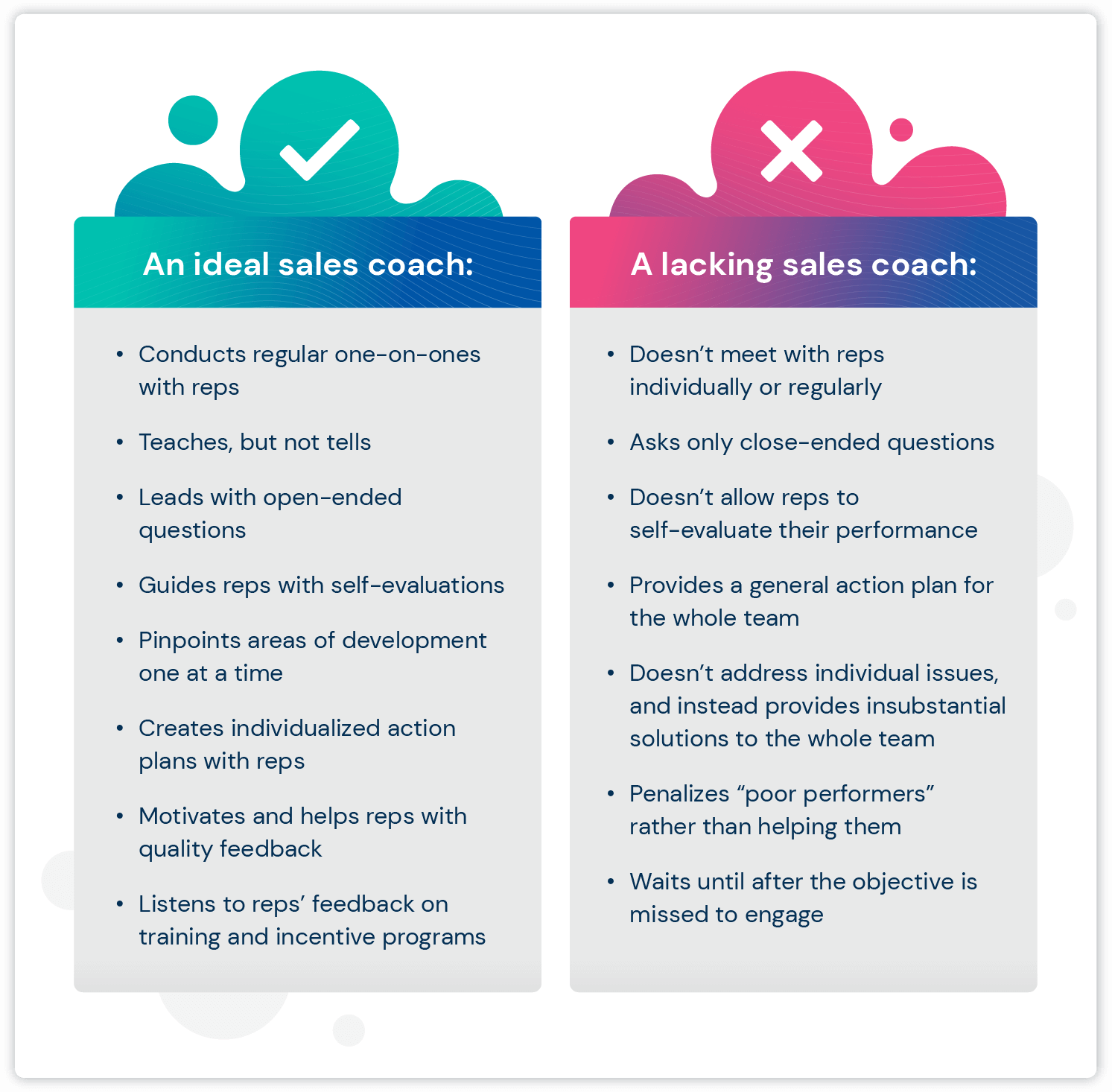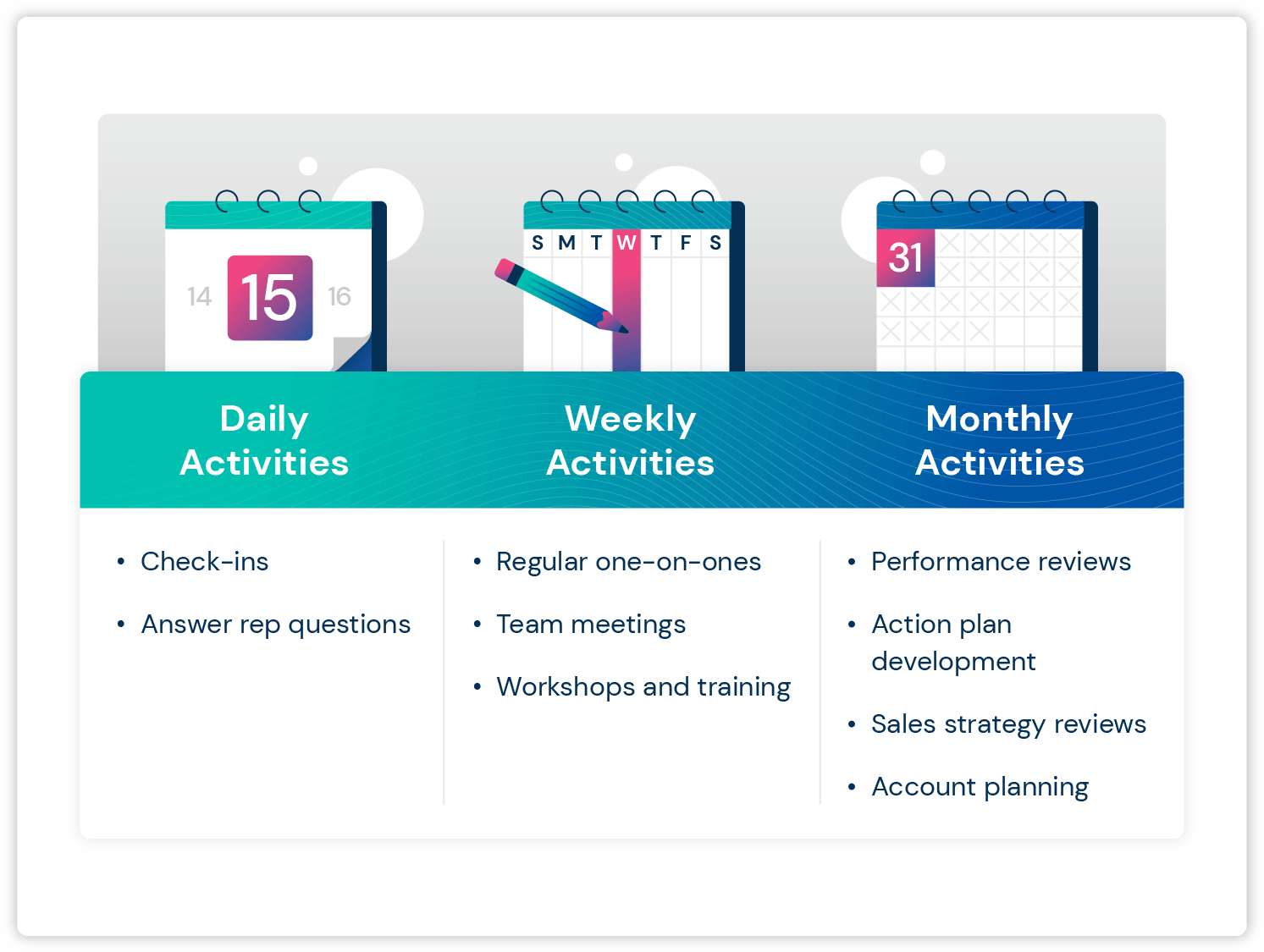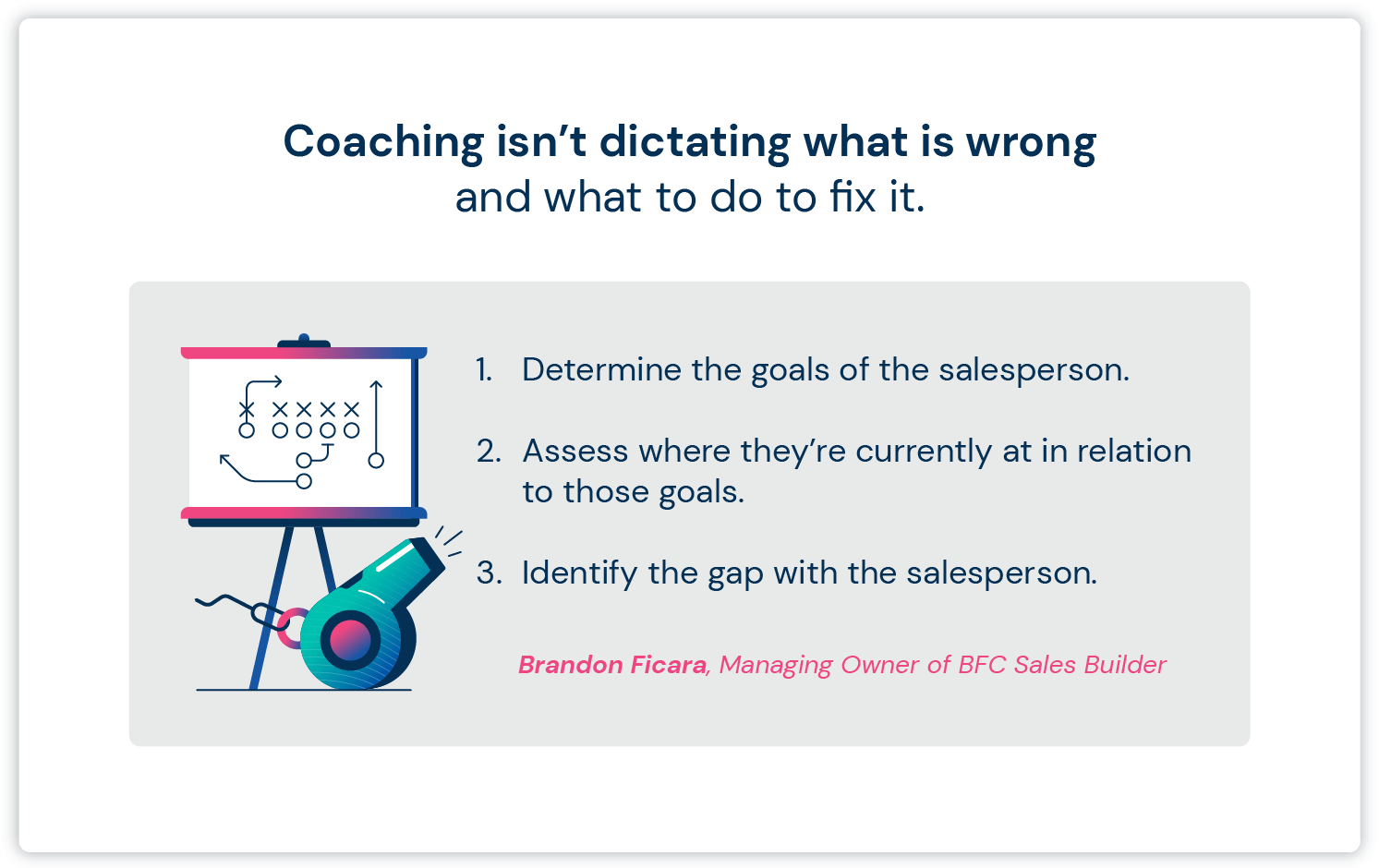14 Strong Sales Coaching Tips To Empower Your Team

Contents
Managing and leading a team of sales representatives to perform well is a big challenge. But what if almost all of your sales reps hit their numbers consistently? Research from CSO Insights shows that 94% of reps meet their quotas with great sales coaching. In this article, we’ll discuss what sales coaching is and how to apply it for excellent sales results in your company.
Let’s get started!
What Is Sales Coaching?
Sales coaching is the process of helping sales reps improve their skills, confidence, and goals — such as individual or team quotas. Executives and sales managers often invest in sales mentoring to maximize sales performance across their entire team. This has a residual effect on the organization as a whole. Sales coaching includes:
- Encouraging actions that lead to success
- Strengthening relationships
- Providing buildable feedback
- Guiding your reps to attain their goals
- Encouraging self-development while achieving sales quotas
The type of sales coaching available varies depending on the needs of the sales team. It can be done in person, over the phone, or via video conference. Sales coaches can work with reps one on one or with entire groups at the same time depending on the exercises and topics covered.
**** Boost your sales calls with Maximus, the leading AI sales coach. Sign up for FREE with coupon code FREEMAX ****
Why Is Sales Coaching Important?

A sales manager’s primary responsibility is to ensure their reps are continually improving. To do this, the manager must provide them with the right skills and tools. That means that sales coaching is essential. It helps reps get better via repetition, practice, feedback and exposure to new sales frameworks.
Furthermore, sales managers can use feedback during coaching to identify areas of the sales process that need improvement. According to Spotio, great sales coaching can boost your sales team’s win rate by 29% — meaning it can add a major boost to your bottom line.
Sales Coaching Examples
To have a better grasp of what sales coaching is, here are some specific examples:
- Listening in on a sales rep’s call and then talking about what went well, as well as areas for improvement
- Holding weekly meetings or checkups with reps where they can reflect on their production, their objectives, and the parts of their sales process they want to work on
- Reviewing a rep’s CRM (customer relationship management) activity such as call volume and note-taking to identify opportunities for process enhancements
- Evaluating a sales rep’s email outreach and conversations with potential buyers to see how they’re guiding prospects through the buying journey
- Live roleplay in which the reps practice their scripts and their responses to common prospect objections they hear
- Practicing remote sales techniques and tools in team meetings

How To Coach and Develop a Sales Team
As a sales manager, you should develop and run an organized sales coaching process that benefits your entire team equally. You must be able to provide content and applications to coach effectively all around the clock, not just when it’s needed.
Below are the most basic activities that sales coaches should conduct on a daily, weekly and monthly timeline.

Having a consistent sales coach process will not only help guide all sales teams on the same level, but will also help onboard new sales managers. Consistent metrics support tracking and analyzing performances.
6 Effective Sales Coaching Techniques
Effective sales management begins with understanding your company structure and team dynamic. Below are a few sales coaching techniques to level up your management skills.
1. Establish a Transparent and Trustworthy Relationship
It’s crucial to build an environment of trust within your team and with your individual sales representatives. If your rep doesn’t believe you have their best interest in mind, then it’s less likely they’ll come to you to seek advice and support.
Authenticity is key — be transparent with your team about past experiences and difficulties that they can relate to in their position. Sharing steps on how you solved problems in the past can help you relate to your reps and help them feel more supported.
2. Conduct Regular One-on-One Meetings With Your Representatives
Scheduling one-on-one meetings with your reps along with team meetings will allow time to discuss progress, objectives, areas of improvement and any questions they may have for you.
It’s also a good time for you to ask them questions to help find the source of an ongoing problem. This is a useful way to “teach but not tell” your reps what they should do. These meetings can also help you get to know your reps’ personalities and improve your professional relationship.

3. Create Action Plans To Establish Future Goals
Within those one-on-one meetings, you and your rep should work out an action plan to achieve their goals within their position. This can be done quarterly and/or when they first jump onto your team. These action plans should include:
- Steps to take to meet the goals
- A schedule for growth check-ins
- Expected time frame of objective completion
Share the action plan document with your reps and revisit it every check-in to evaluate progress.
4. Ask Your Team to Self-evaluate
Conducting a self-evaluation is a great starting point for a one-on-one agenda or team meeting. A self-evaluation allows your reps time to reflect on their current performance and reveal what they believe they need to improve on.
Some questions you may ask them to help navigate self-evaluation include:
- What went well this quarter and what didn’t?
- What were the biggest challenges you faced this quarter?
- What was your biggest win?
- Is there anything you wish you would’ve done differently?
These questions can help steer the conversation with your reps and can influence the next action plan you make with them.
5. Utilize Your Best Sales Representatives
In this industry, there’s always room to learn from others, even as a sales manager. Notice a couple of your sales reps are doing especially well with prospecting? Is there a particular strategy or technique they’re using that you haven’t seen before?
Have them present their strategy to the rest of your team in a team meeting. This is valuable for team connection and allows the chance for your team to build an even more effective strategy from the one presented. Learning from coworkers can be just as effective as learning from a team leader.
6. Motivate Your Team With Incentives
Improving your team’s sales month over month is no easy task. Sales incentives are one way to motivate your team to exceed their goals. Incentives may include:
- Sporting tickets
- Gift cards
- Bonuses
- Added PTO
- Team trips
- Tech gifts
- Memberships
Check to make sure your company allows for sale incentives before building out a sales incentive program. Ask your team for feedback on the program and incentives so you know which rewards mean the most to them.
8 Sales Coaching Best Practices
The goal of developing your sales team coaching abilities is to increase your impact on your representatives’ individual development. Use these best practices as a guide when developing your instructional process.
7. Learn What Drives Each Salesperson
One size does not fit all when it comes to sales coaching. Not every rep will respond to the same motivation triggers. Sure, most sales reps will be money motivated, but that does not mean that their specific income goals are the same. Someone may be focused on family expenses, for example, while another person wants to pay off student loans.
To truly motivate your sales team, you need to uncover their core drives. In order to do that, you can ask them questions like:
- Are you satisfied right now?
- What things do you want to do, have or be in the future?
- What is your long-term motivation?
- How can management tell when you’re not motivated?
- How can I help you if it seems you’re not motivated?
It’s important to break through a fixed mindset to allow for positive growth and development.
For example, “if you have a rep who that’s stuck in a negative mindset, send them a motivational video to get them back into a positive mindset.” – Morgan J Ingram
Or you may start your team meetings with a motivational quote discussion. Tap into what your individual reps need for motivation and deliver when required.
“If you have a rep who is stuck in a negative mindset, send them a motivational video to get them back into a positive mindset.”
|
8. Focus on Providing Positive Feedback Instead of Negative Feedback
Studies show that positive reinforcement is more effective than negative feedback, so aim to give three times as much positive feedback than negative. It also helps morale, which is incredibly important in sales.
Think of it this way: Salespeople deal with rejection and negativity all day long. It’s hard enough to maintain motivation and positivity in this environment, so as a sales manager, you need to be a source of inspiration and encouragement. By focusing on the good things your reps are doing, they’ll be encouraged to keep performing well and cement good habits in their minds.
9. Coach Both Poor Performers and High Performers
There is a misconception that the only people who need coaching are poor performers. After all, high performers are naturally skilled and motivated, right? Well, it turns out that sales is a largely learned skill. Some people may have a head start in terms of a knack for selling, but they still need coaching.
Even if someone is exceeding their sales objectives every quarter, there is always room for improvement. If you like the way your best salespeople are performing now, you’ll absolutely love their new production numbers with consistent coaching.
10. Understand That Coaching and Managing Are Different
Sales coaching and sales management are similar in some ways. In both contexts, you’re responsible for getting better results out of your team. However, in practice, they can be very different roles with unique approaches to helping your reps.
“Recording cold calls and analyzing them afterward is an effective way to coach.”
|
If you’re tasked with performing both of these roles, it’s best to separate them as best you can. Feel free to dive into reviews of phone calls with reps when you’re in coaching mode. “Recording cold calls and analyzing them afterward is an effective way to coach.” – Jack Knight.
When you put your sales manager hat back on, schedule time for things like career development, territory assignments and overall performance metrics.
11. Use Technology To Support Coaching
Technology is an integral part of any company’s sales process. Not only should you leverage technology for interacting with and selling to customers, but internally with your team as well.
For instance, you can use platforms like NetSuite to gain insights into your team’s sales performance from data-driven metrics. Video platforms can be used to distribute sales coach training to reps even if they are not located at your main office. By taking advantage of technology, you can speed up your sales process, coaching and overall timeline to achieve key objectives.
12. Ask Questions To Help Guide
Asking questions in discussions rather than telling your reps what they should do will help them develop more self-awareness of their performance. In your one-on-ones, you can start by asking your rep a couple of questions to see how they’re doing and if there is anything they would like to discuss.
Below are a few good questions to start with:
- Is there anything you would like to discuss today?
- Is there anything you would like more training on?
- Are there any areas you would like to improve on?
Asking targeted questions about an issue they’ve run into will help them better recognize what they should do and what they’ll want to do the next time a similar problem arises.
13. Reinforce With a Training Materials Library
Regular check-ins work well for addressing areas of improvement or habits that need breaking, but they may be forgotten about between meetings. Reinforce what you’ve discussed in team meetings with a shared library of resources that can help reps when you’re not available.
Your library should include:
- Training videos
- How-to guides
- Webinars
- Relevant books
- Sales courses
Having a readily available resource hub will push your team to take initiative in improving their sales skill set and bring in better results month over month.
14. Work on One Improvement at a Time
To be an effective sales manager, it’s better to focus on one area of improvement rather than multiple at the same time. You’ll see much quicker and better results this way. If you overload your rep with trying to improve multiple areas, you won’t see as much measurable progress and you’ll end up with a discouraged employee.
How To Measure Sales Coaching Effectiveness
If you can’t measure it, then you can’t manage or improve it, so it’s vital to track all sales metrics before, during and after coaching your sales reps. It’ll help you evaluate your own performance as well as the reps’ commitment to improvement.
Performance Metrics
To measure coaching impact on rep performance, you can track the following metrics:
- Average deal size and profitability
- Individual retention rate and service renewal rate
- Average upsell amount and frequency for each rep
- How many reps are meeting or exceeding their sales targets
- Change in closing ratios
Tracking these metrics will uncover trends and common challenges that your team is having and allow you to develop and offer specific solutions to fix the issues.
Observational Metrics
Observational metrics involve higher-standing managers observing sales managers to see how effective the current sales coaching process is and how it’s being used. For example, if you notice a part of the training course is not being used often, it’s probably not helpful to the sales reps and therefore could be removed.
Another example is if a whole team fails to meet quarterly goals. A director can look to see how the sales manager interpreted the company’s coaching process, and whether or not their interpretation affected their reps’ performance.
Cultural Metrics
You can use company culture indicators to gauge sales coaching effectiveness. These metrics include:
- Rep satisfaction with the company, role and management
- Rate of attrition
- Promotion rate
The metrics above can provide insight into how effective the current sales coaching process is at your company, and what can be done to continue to motivate reps to reach their goals and see improvements.
Common Sales Coaching Challenges
Sales coaching is an excellent investment in your team. However, it’s not easy to do at a high level. That’s why sales managers should be aware of common challenges and pitfalls to overcome. Examples include:
- Get lost in the details
- It’s human nature to “tell” rather than “ask.”
- Can be defensive against criticism by nature
- May not have a clear idea of what good sales coaching entails
- May give advice that lacks specific takeaways.
- Need to learn new skills while maintaining their authenticity
- Difficulty in maintaining consistent weekly meetings
- Fails to offer individualized advice and attention reps need
- A lack of structure in team sessions
- Underdeveloped staff managers lack leadership experience
- Managers spread thin with a large team of representatives
What Makes a Great Sales Coach?
Sales coaching is an art form. To be great, a sales coach must be authoritative and insistent enough to evoke behavior change in their team. On the other hand, sales reps must feel that they can open up to the sales coach and discuss their weaknesses transparently.
Don’t worry — even if this dual role does not come naturally to you, it can be learned just like sales. Therefore, you must “train the trainers” first and foremost. Sandler Training’s Head of Global Strategy and Growth, Damon Jones, suggests that an effective sales coaching program should “develop and certify coaches before they engage with reps.”
Conclusion
As a sales manager, there are a lot of things on your plate. But one of the priorities that should always come first is coaching your team. Whether you do it yourself or hire an outside sales coach, it can boost motivation, productivity, and ultimate sales revenue. That way, your business continues to win new deals and grow faster than the competition.





